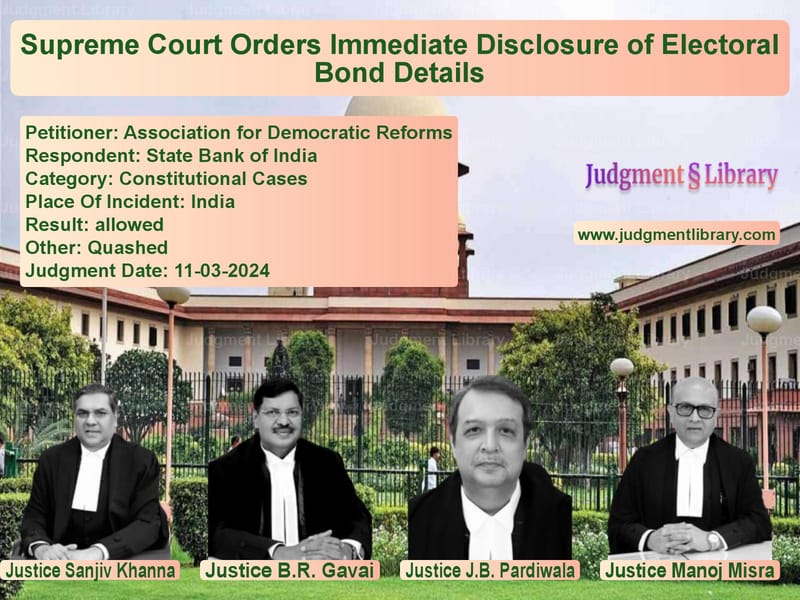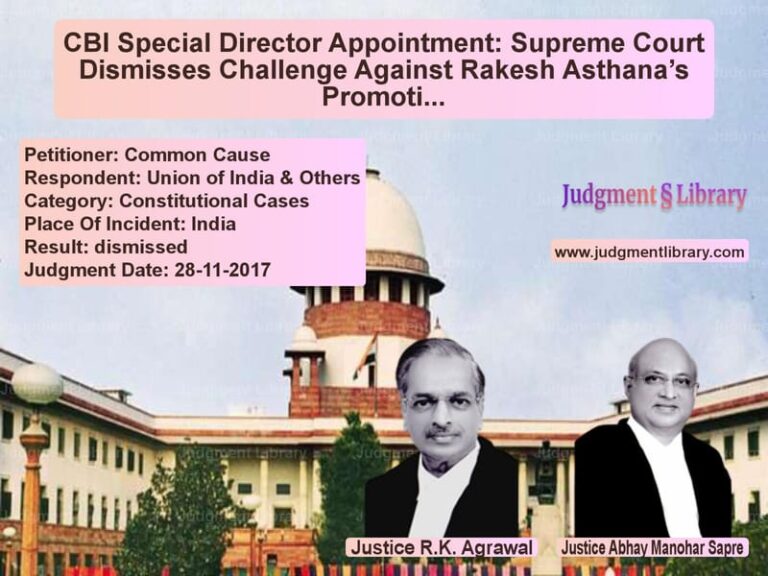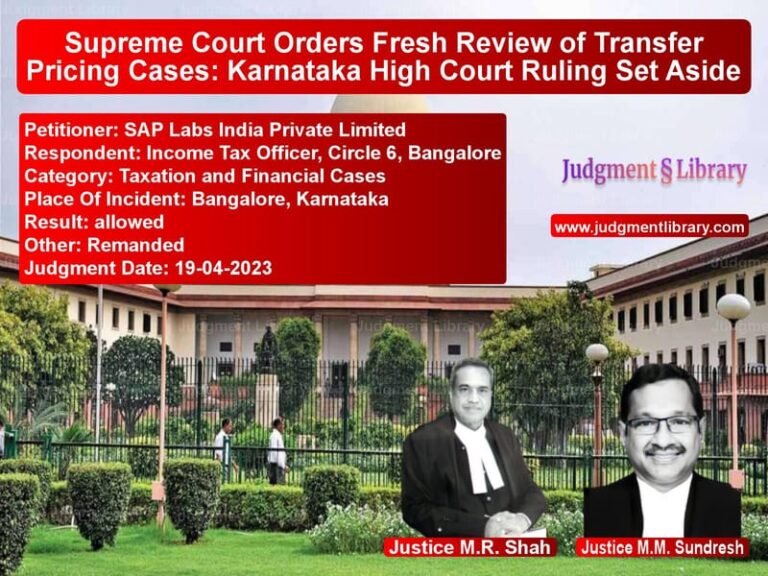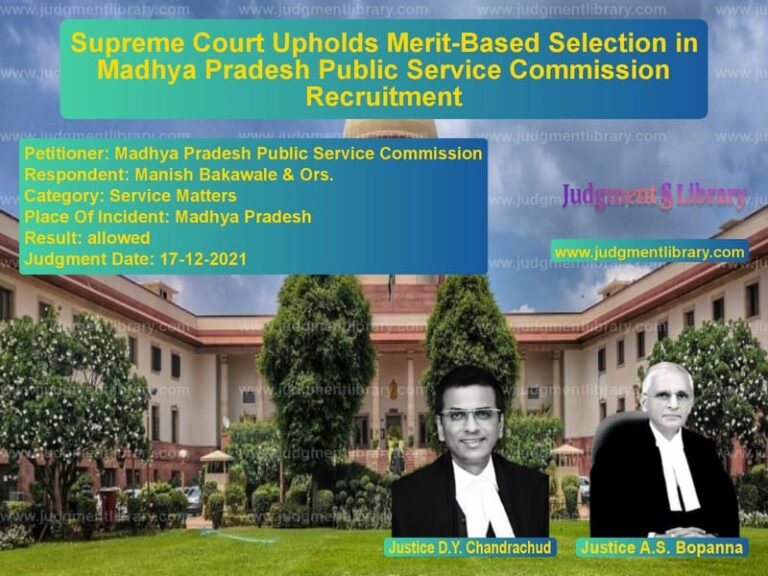Supreme Court Orders Immediate Disclosure of Electoral Bond Details
In a major ruling, the Supreme Court of India rejected the State Bank of India’s (SBI) plea for an extension of time to disclose details of electoral bond transactions. The judgment in State Bank of India v. Association for Democratic Reforms & Others reaffirms the Court’s commitment to electoral transparency, directing SBI to submit the full list of electoral bond purchasers and recipients by March 12, 2024, and mandating the Election Commission of India (ECI) to publish the data by March 15, 2024.
Background of the Case
The Electoral Bond Scheme was introduced in 2017 as a method for individuals and corporate entities to make anonymous donations to political parties. However, it faced legal challenges from Association for Democratic Reforms (ADR) and other petitioners who argued that the scheme violated the citizens’ fundamental right to information under Article 19(1)(a) of the Constitution. On February 15, 2024, the Supreme Court struck down the scheme as unconstitutional, ordering full disclosure of donor and recipient details.
Petitioner’s Arguments
ADR and other petitioners argued that:
- Violation of Right to Information: The anonymity provision deprived voters of their right to know who funds political parties.
- Encouragement of Corruption: The lack of transparency created avenues for undisclosed corporate influence over policymaking.
- Unfair Electoral Advantage: The ruling party disproportionately benefited from anonymous donations.
- Misuse of Banking Secrecy: SBI’s handling of electoral bond data prevented public scrutiny of political funding.
Respondent’s Arguments
SBI and the Union of India defended the scheme, asserting:
- Protection of Donor Privacy: The anonymity was designed to prevent political retribution against donors.
- Legitimization of Political Donations: The scheme aimed to shift political funding away from unaccounted cash transactions.
- Technical Challenges in Data Compilation: SBI argued that donor and recipient details were stored separately, requiring additional time for processing.
Supreme Court’s Observations
The Supreme Court dismissed SBI’s plea for an extension until June 30, 2024, emphasizing that compliance was non-negotiable. Delivering the judgment, Chief Justice Dr. Dhananjaya Y Chandrachud stated:
“The non-disclosure of political donations infringes on citizens’ fundamental right to information and undermines democratic accountability. SBI must comply with the order without delay.”
The Court further ruled:
- The Electoral Bond Scheme facilitated opacity in political funding: The scheme concealed the source of political donations, undermining democracy.
- Article 19(1)(a) Violation: The lack of disclosure violated the citizens’ right to information.
- Article 14 Breach: Unlimited corporate donations, combined with donor anonymity, created an arbitrary advantage for ruling parties.
Final Judgment
The Supreme Court issued the following orders:
- Immediate cessation of electoral bonds: SBI must stop issuing new bonds.
- Disclosure of all past transactions: SBI must submit details of all electoral bonds purchased since April 12, 2019, to the ECI.
- Publication of donor information: The ECI must upload the full list of donors and recipients on its website by March 15, 2024.
- Return of unredeemed bonds: Any bonds within their validity period must be returned to the purchaser.
Impact of the Judgment
The ruling has far-reaching consequences for political financing:
- End of Anonymous Corporate Donations: The judgment ensures political funding transparency.
- Strengthened Electoral Democracy: Voters will now have access to political funding information before elections.
- New Campaign Finance Reforms: The government may introduce alternative political funding mechanisms.
Conclusion
The Supreme Court’s decision marks a turning point in electoral finance regulation. By ensuring transparency in political contributions, the Court has reinforced democratic accountability and set a precedent for future reforms in election funding.
Petitioner Name: Association for Democratic Reforms.Respondent Name: State Bank of India.Judgment By: Justice Dhananjaya Y Chandrachud, Justice Sanjiv Khanna, Justice B.R. Gavai, Justice J.B. Pardiwala, Justice Manoj Misra.Place Of Incident: India.Judgment Date: 11-03-2024.
Don’t miss out on the full details! Download the complete judgment in PDF format below and gain valuable insights instantly!
Download Judgment: association-for-demo-vs-state-bank-of-india-supreme-court-of-india-judgment-dated-11-03-2024.pdf
Directly Download Judgment: Directly download this Judgment
See all petitions in Fundamental Rights
See all petitions in Constitution Interpretation
See all petitions in Public Interest Litigation
See all petitions in Judgment by Dhananjaya Y Chandrachud
See all petitions in Judgment by Sanjiv Khanna
See all petitions in Judgment by B R Gavai
See all petitions in Judgment by J.B. Pardiwala
See all petitions in Judgment by Manoj Misra
See all petitions in allowed
See all petitions in Quashed
See all petitions in supreme court of India judgments March 2024
See all petitions in 2024 judgments
See all posts in Constitutional Cases Category
See all allowed petitions in Constitutional Cases Category
See all Dismissed petitions in Constitutional Cases Category
See all partially allowed petitions in Constitutional Cases Category







